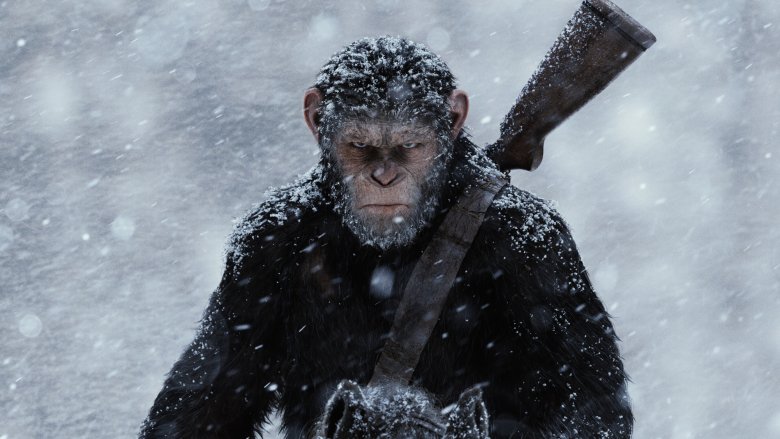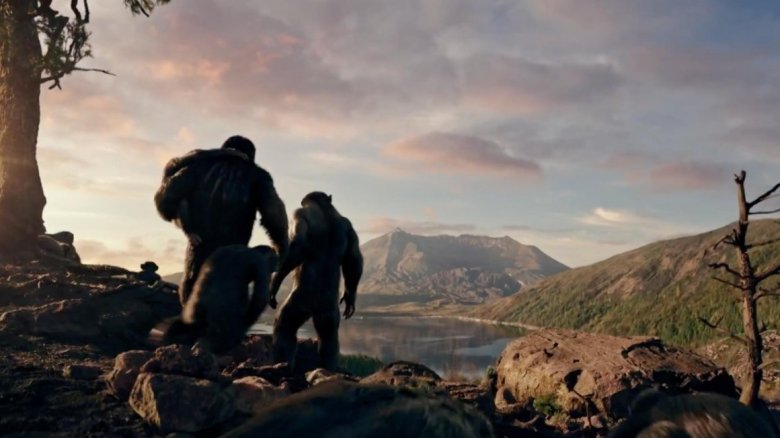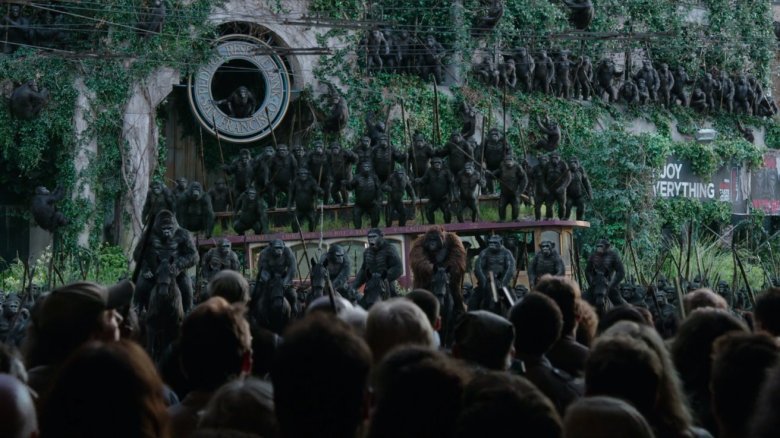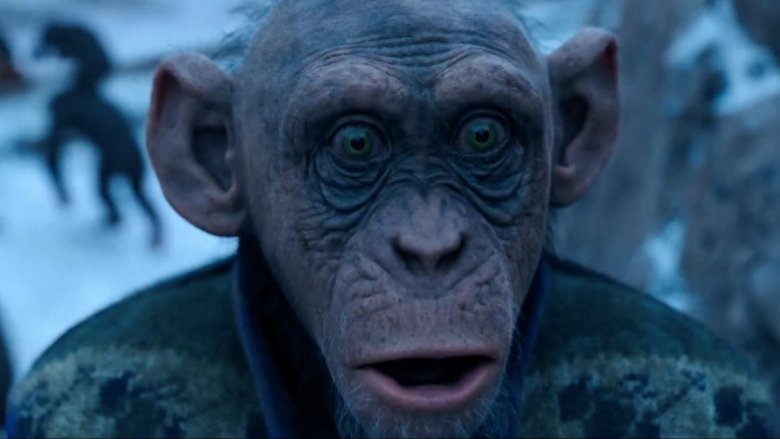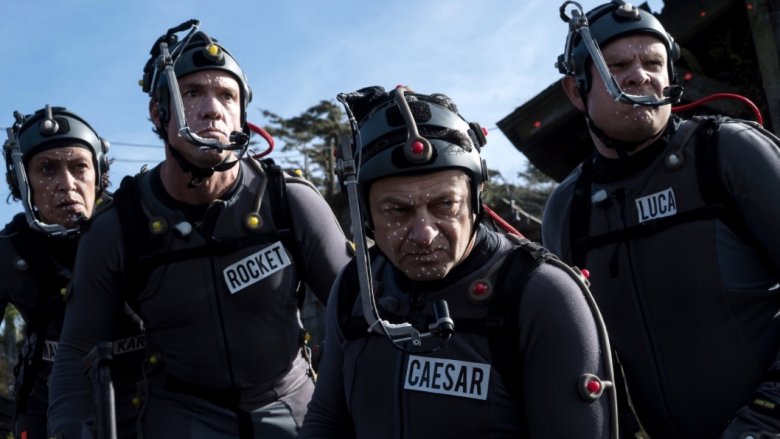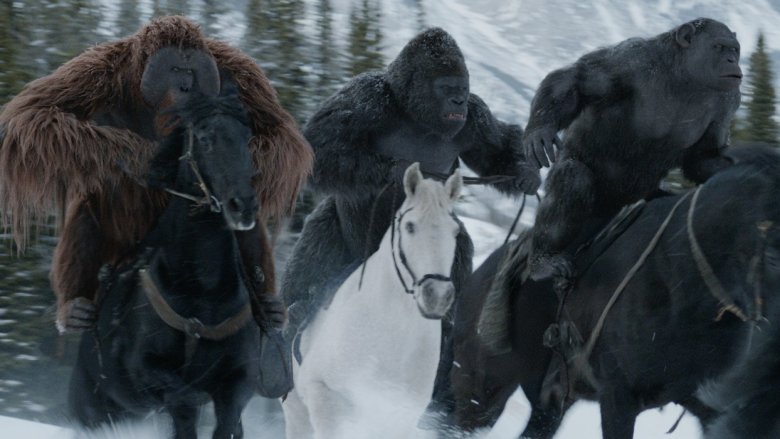The Ending Of War For The Planet Of The Apes Explained
The war for the planet of the apes is over, and — spoiler alert — humanity lost. The trilogy of films comprising the prequel act to the Planet of the Apes story has come to an end, with most storylines firmly concluded, and important characters decisively dead. What began in 2011 with Rupert Wyatt's surprisingly good Rise of the Planet of the Apes and continued in 2014 with Matt Reeves' rapturously-received Dawn chapter finishes here in the series' longest and most grim installment.
Humanity, it appears, is no more, and by the very end of the movie, a driving force behind the ape uprising is no longer in a position to lead. Much of the story feels concluded as the film ends, but there's a surprising number of places where this franchise can continue, and War for the Planet of the Apes' ending opens up a lot of possibilities for where the story may go. With humanity finally defeated, there is nothing but potential on the planet of the apes.
Paradise found
After the decisive defeat of the humans frees Caesar and his apes from captivity, the survivors band together behind Caesar on a pilgrimage through the desert. After spending the majority of the movie separated from his followers, single-mindedly pursuing vengeance against a human foe, Caesar ends his quest by returning to his role as a leader and shepherding them safely to a beautiful oasis in a secure and blooming valley, untouched by human hands or conflict. After three movies' worth of uprising and fighting, the apes are finally home. It's a message Caesar shares to the other apes with his last words: "You are all home now. Apes are strong, with or without me." Overlooking his people as they enter their new homeland, he dies an ape, and becomes a legend.
Despite his death, the movie ends on a note of optimism as Caesar fades away on his hilltop, and the camera pans up into the sky. Caesar accomplished his goal, winning the war and leading his people to a homeland. With his dying words, he leaves hope for a future without him. Caesar led them to this point — it's Caesar's teachings that will guide them through the future. But what does that future look like? What happens next?
The humans will never be the same
War's central conflict follows Caesar as he navigates a humanity's last stand-style assault on his population led by the madman Colonel, an Apocalypse Now-esque Kurtz-lite played by Woody Harrelson. The Colonel's ultimate fate, succumbing to the effects of the debilitating simian virus before killing himself, doesn't bode well for the remaining survivors of humanity.
In its original incarnation, the simian virus enhanced the intellects of apes while killing humans, leaving immune humans unaffected and able to fight the apes. By War, that virus has mutated to affect the remaining survivors, de-evolving their intellects and taking away their capacities for speech. Should the virus spread easily — as it appears to, considering the ease with which the human girl Nova spread her infection to the Colonel — then it's likely destined to infect the remaining pockets of humanity with devastating speed.
Whether dead or de-evolved by the effects of the corrosive simian virus, humanity ends this trilogy utterly wrecked and in a primitive state. That de-evolution lines the story up with the original 1968 movie, where apes had turned the tables on humans to the point that humans, inarticulate and unintelligent, were hunted in the wild by the apes and kept in cages as prisoners or as pets.
Worldwide conquest
Like so many other movie franchises these days, the Apes series all started with a book. The original Planet of the Apes, a French novel first published in 1963, showed a society of apes and humans that had been completely reversed, with the apes in charge of advanced technology and infrastructure, and social classes not too different from humanity's. This material was originally incorporated into a screenplay by Twilight Zone head scribe Rod Serling, but wasn't pursued due to budgetary reasons.
In a time of practical effects and makeup, this particular vision was considered too expensive to produce. But now? Not only do advancements in computer technology make the idea possible, producers have more than enough incentive to pursue it, if they feel like it, because these movies make good money, and what's more, people like them.
Even though the end of War seems to lead into the original Planet of the Apes movie, don't be surprised for Hollywood to keep filling in the gaps with more movies, now that the apes have taken over. There's never been a better time to swing for the fences with a fully-fledged alternate reality of apes in the modern era. Think about it — banker apes, police apes, apes in driverless cars. Little apes in middle school, prima donna actor apes. This is the one aspect of the original source material that has yet to be explored. Would it be any good? Maybe. Would it be fun to watch? Yes.
Potential for gorilla wars
In an interview with Yahoo Movies, Dawn and War director Matt Reeves discussed one particular direction that the series may go following the death of Caesar. The character of Bad Ape, who's introduced as being ignorant to the larger conflict between apes and humans, spent the last few years isolated as an escapee from the zoo. Reeves uses Bad Ape as an example to raise an interesting point.
"There are apes who grew up without the benefit of Caesar's leadership," Reeves said. "and they might not just be pockets of one or two. There might be actually colonies, and might that be where future conflicts come for Caesar's apes? They have the benefit of the integrity that he's instilled in them, so what's going to happen when they encounter others who didn't have that?"
As the events of Dawn demonstrated, violence is not foreign to the new and improved ape race. If a crabby provocateur like Koba — the Scar to Caesar's Simba — can spark a conflict pitting ape-against-ape through his failed coup, imagine what a more wise and patient mind could do. Caesar may have been the patient zero for this new world order following the creation of the simian virus. But is it so hard to believe another Caesar figure could have risen up independently during long years of worldwide war? Would they have a different vision for the world? Maybe we'll see.
Apes beyond Caesar
Between Middle-Earth's Gollum and ape leader Caesar, actor Andy Serkis has spent most of his career bringing a startling amount of humanity to computer-generated creatures through his immaculate motion-capture work. With the death of Caesar, he bids a fond farewell to the most recent of his creations. In an interview with Den of Geek, the actor talked about what it felt like to close the book on this character.
"I have a huge affection for [Caesar]," he said. "I've played him through three movies, all the way from the beginning of his life to late maturity, shall we say. So playing [the final] scene with Karin [Konoval, who plays Maurice]—she's so extraordinary in that scene as well. We're both aware that it's the end of a chapter, and I really loved the challenges of playing Caesar throughout the three movies. And I'll really miss him as a character, actually."
So the story of Caesar is done, and if the series wants to move forward now, it will have to grapple with how to move forward without Caesar in the lead. Without the promise of another chapter in the development of Caesar from a caged lab experiment to a free-standing king, and seemingly no humans left to fight, there's no telling who or what exactly a sequel's narrative might be wrapped around. Or who Serkis would return to play — if he decided to return at all.
Could it lead into a remake?
One possibility that all three of these Apes movies have been prepping for is a direct tie-in with the 1968 original — the one that ended with Charlton Heston's astronaut pounding sand in front of the ruined Statue of Liberty as he realized that the planet of the apes was Earth all along. With War concluded, the world is changed, and the stage is set. All that's left to do is cast, say, Taylor Kitsch as the astronaut, and baby you've got a remake going.
Why wouldn't it happen? Well, for one thing, the plot is tired — the original movie, its sequel Beneath the Planet of the Apes, Tim Burton's remake, and two separate TV shows based off of the films have all used the "astronaut returns to an ape-ruled world" plotline, and after three movies' worth of increasingly-daring filmmaking in this current trilogy, would audiences really be interested in watching another earthly yokel coming back from Mars to yell "you maniacs!" and call the place a madhouse?
It's entirely plausible, maybe even desirable for the astronauts mentioned in Rise to remain an Easter egg, a little nod to filmgoers who have some knowledge of the original series and its tropes. It wouldn't be the only thing that the new series remixed into its own concoction, and if this Apes series does continue, perhaps those human Martians should remain forever floating in the sky, a reminder of what's been before instead of a teaser of what could be.
